Spoiler Alert: They Live
By:
November 9, 2011
Caveat lector: may contain spoilers.
They Live, dir. John Carpenter, 1988.
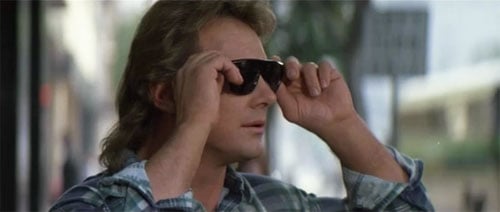
They Live may be the most realistic horror movie you’ll ever see.
A train pulls away, revealing a tiny figure in the middle distance, perhaps some kind of modern day hobo with a flannel shirt and a pack, dwarfed by the rail yard, the overpasses, and other impersonal architecture of transport and edges of cities.
That figure, of course, is Nada, “Rowdy” Roddy Piper, drifting into town in search of an honest day’s pay for an honest day’s work. Set in a nearby present, Nada’s American Dream has devolved into massive unemployment, industrial flight, tent cities, and radical income discrepancy. “I just want to work,” says Nada, with the incongruously sweet expression he maintains in the film. “I still believe in America.”
It’s nice that Nada still believes in America. Because the people and systems that run the country have checked out long ago.
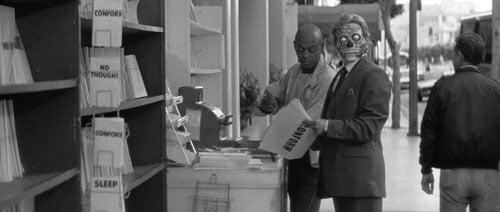
He manages to score a day laborer position at a construction site by virtue of having his own tools, and calling the foreman “sir.” Sweetly, of course. He won’t get his reward, his pay, until the next week, although our reward comes much earlier, when he strips off his shirt in order to maintain his reputation as the hardest working man in show business. Because “Rowdy” Roddy Piper was, if anyone is still unaware, a high-profile professional wrestler, with the chiseled physique to show for it. At the closing whistle, a fellow laborer, recognizing him as the new kid in town, offers temporary shelter, at the local homeless encampment a few blocks away.
The local homeless encampment turns out to house most of the regular people in town, who’ve lost their homes due to foreclosure and unemployment, and have banded together to create lean-tos, organize a soup kitchen, share the generator, etc. Unlike our current #Occupy encampments, this assembly seems born of need, not politics, and most people in it are struggling day-to-day, too downtrodden to have a plan.
But all groupings of the dispossessed attract others: the agitators, the street preachers, the ones with plans, of various sorts. We hear the usual rhetoric, about “them,” the ones that control the world, that have the power, that want to keep “us” down. Before long, Nada discovers the local church is fronting for some kind of organization; the fake church services are taped and broadcast, providing a sonic cover for the fomentation of the Resistance within. Nada sneaks into the basement during a meeting and discovers a cache of odd revolutionary accessories — boxes of oversized sunglasses. Mystified but intrigued, he hides one box in the crawl space and makes his way back to the encampment.
There’s no time to mull it over. Moments later the helicopters and bulldozers and police in riot gear invade the encampment, destroying the tent city, raiding the church, and (it is presumed) killing the organizers.
After a low-tech, gritty chase scene, Piper makes his way back to the church and retrieves the box. For want of anything better to do, he tries on the sunglasses.
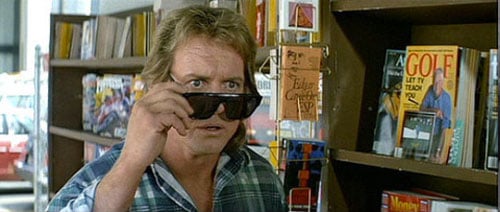
Whereupon, walking out into the busy city streets, he has a revelation. The spectacles show him the real messages behind The Spectacle, as every billboard, advertisement, magazine, TV show, and sign, really broadcasts generic commands: BUY. SUBMIT TO AUTHORITY. STAY ASLEEP. NO IMAGINATION. CONSUME. OBEY. Even paper money, when seen through the glasses, reads THIS IS YOUR GOD. In addition, the glasses reveal the aliens masquerading as people. Actual aliens from other planets; without the glasses they look just like us. The 1% of “us” that live in the McMansions and are captains of industry. In other words, “them.”
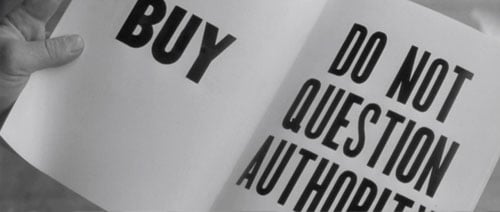
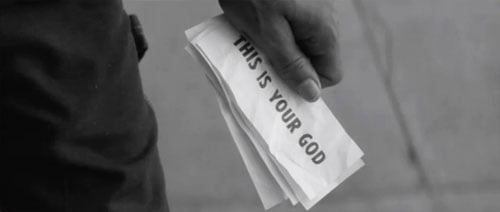
This is our first look at the reality, and the magnitude, of the conspiracy that controls the world. Some humans have been co-opted to aid the aliens, with the rewards of money, position and power. And they are the only humans who have these things. Everyone else is down and on their way out. Of course, all of humanity is on its way out; the bargain the Trumps of the world have made is short-sighted, even for them. When the aliens have extracted what they need (the value of labor, plus any surplus value, presumably), they will wipe us out and move on to the next planet.
The Resistance has been weakened and scattered. But now they — we — have a chance: “Rowdy” Roddy Piper has become the Resistance. He has the sunglasses. And he’s all out of bubblegum…
He takes the fight right to where it counts. To the bank.
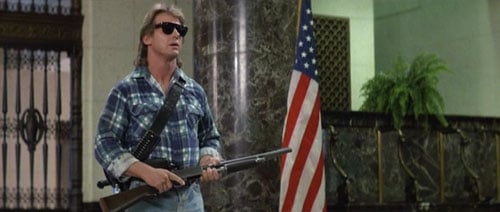
The film includes the requisite chase scenes and shoot-outs, but none so impressive as the World Wrestling Federation-style fistfight in a garbage-strewn alley when Nada tries to get his one friend from the day job, Frank (Keith David), to put on the glasses, and see for himself. Frank refuses, wanting to get as far from the newly-politicized, and weaponized, Nada, as he can. Frank doesn’t want to know about any conspiracy. He just wants to go to work, support his kids, type of thing. Head down, nose to the grindstone. Shirt presumably off, at least sometimes. But Nada finds that he must insist. In a fight as choreographed as an Errol Flynn sequence, but in a totally different style, Nada and Frank WWF without the ring, fighting to the point of exhaustion, and — it looks like it’s real! What do you mean it’s not real! — then starting the fight all over again. And again. And again. WWF-fighting-style outside its context looks oddly hardscrabble and believable, as if under all the showmanship and stylization lies real, desperate, inelegant aggression. This is choreography that gets under the skin.
The film’s alternating greyscale and desaturated palettes, restrained set design, and unlovely, industrial feel could read as “art film,” but instead make it look like video, which in the late 1980s was making significant incursions into the film market, and was starting to stand for “reality” as a visual text. Piper’s open face and lack of affect, although thoroughly composed, add to the sense of verisimilitude. This is intentional. For in a horror film about alien infestation, what turns out to be really horrifying is — the reality of our economic system.
You may exit the movie wishing for some glasses, hoping the cinema could distribute them at the door, perhaps as a kind of reverse-3D accessory for life this side of the screen.
But in reality, we don’t need oversized sunglasses to see what Nada has seen.
We just need to take the blinders off.
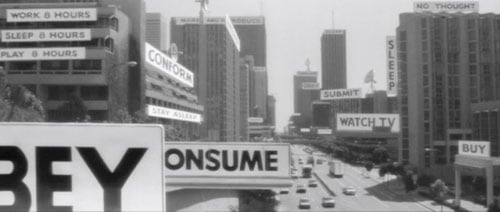
A version of this essay appeared on the Brattle Theater Film Blog, November 2011.
Read more Spoiler Alerts.
PRO WRESTLING AT HILOBROW: “Rowdy” Roddy Piper | Giant Haystacks | The Iron Sheik | Hulk Hogan | The Rock
